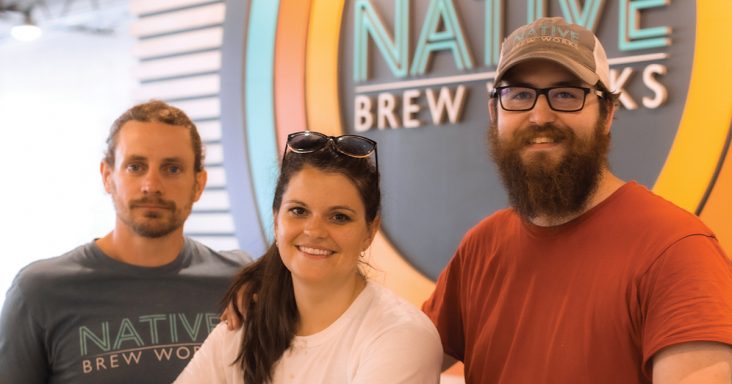Native Brew owners hope to bring ‘cool factor’ to West End Jonesboro
by July 12, 2021 9:14 pm 4,138 views

From left: Jackson Spencer and Ellen and Dustin Hundley of Native Brew Works in Jonesboro.
Lifelong friends Jackson Spencer and Dustin Hundley had a similar problem. Spencer was working in various capacities of the retail sector, while Hundley spent each day in a cubicle working as an engineer.
The two men, both now age 30, thought they had a different purpose. As a hobby, Hundley liked to brew beer. Spencer wanted to operate his own business. When Hundley’s wife, Ellen, who also was a childhood friend and Jonesboro native and Spencer’s wife, Lindsey, decided they wanted to join the duo in a new business venture, Native Brew Works was born.
Spencer told Talk Business & Politics he knew he was destined to not be in retail.
“God, I was not good at it,” Spencer said with a laugh describing his retail experiences. “I knew I needed to do something else. I wasn’t good at my job. I knew I needed to go.”
Hundley had been experimenting with beer brewing for years, and had won awards for his recipes, but when Spencer first approached him about turning it into a business he hesitated. Days later, he decided to make the life-changing decision.
“I came from a brewing background. … I got tired of my cubicle,” he said.
When Hundley approached his wife, it didn’t take long for her to get on board, she said.
“It was an easy sell,” the full-time occupational therapist said. “It was an opportunity to build something of our own.”
 The U.S. beer sector is big business. The beer and malt-based drink industry produced about $120 billion in 2019. That figure dipped to $100 billion in 2020, largely because of COVID-19 shutdowns, according to the Beer Institute and the National Beer Wholesalers Association (NBWA). That equates to about 204.8 million barrels of beer being sold each year in the U.S. The average person, over the age of 21, consumes about 27 gallons of beer, cider or related products, according to the U.S. Census Bureau.
The U.S. beer sector is big business. The beer and malt-based drink industry produced about $120 billion in 2019. That figure dipped to $100 billion in 2020, largely because of COVID-19 shutdowns, according to the Beer Institute and the National Beer Wholesalers Association (NBWA). That equates to about 204.8 million barrels of beer being sold each year in the U.S. The average person, over the age of 21, consumes about 27 gallons of beer, cider or related products, according to the U.S. Census Bureau.
The widespread closures of on-premise retail establishments such as bars, restaurants, hotels, stadiums and event centers during 2020 resulted in a significant decline in draft (keg) beer sales. Draft beer’s share of total volume fell from 10% in 2019 to about 6% in 2020. During the same period, beer sold in can packages rose from 60% in 2019 to 67% in 2020. Glass bottles experienced the least impact, accounting for 29% of sales in 2019 and 28% in 2020, the U.S. Census Bureau reported.
According to The Alcohol and Tobacco Tax and Trade Bureau (TTB), there were 6,406 U.S. reporting brewery facilities/locations in 2020, only six more than what was reported in 2019, according to the NBWA. Almost a quarter of these breweries were classified as brewpubs that mostly brew beer for direct-to-consumer sale on brewery-restaurant premises. Brewpubs typically brew less than 1,000 barrels (31,000 gallons) of beer per year, though larger chains have emerged around the country. In 2020, more than 90% of all U.S. breweries made fewer than 15,000 barrels (465,000 gallons) and accounted for about 3% of total volume, according to NBWA.
Before starting this business venture, Spencer went on a physical and spiritual journey that spanned continents. Spencer grew up in Jonesboro and when he graduated from high school he attended Arkansas State University studying graphic design and marketing. When he graduated, he started working at Gearhead Outfitters, but he felt like something else was calling him, he said.
He took a journey to northern Spain where he walked the famed Camino de Santiago trail. People have traversed the 500-mile route for hundreds of years. Spencer walked from village to village meeting people from all over the world.
“It was a spiritual journey,” he said.
His next walking challenge would span more than 2,100 miles and several months. On April 28, 2015, Spencer’s father dropped him off at the starting point of the Appalachian Trail in Springer Mountain, Ga. The trail takes an average hiker five to seven months to traverse and only one out of every four hikers who begin in Georgia arrive at the trail’s end in Mount Katahdin in Maine.
The trek was grueling. Each night he slept on an air mat and in the mornings he drank coffee and ate oatmeal. Rain and wind hit the trail numerous times. The hilly terrain was a challenge. Spiderwebs fluttered in the air, and mice and raccoons were a constant nuisance.
Did he ever want to quit? “Everyday,” he said with a laugh.
Despite the obstacles, Spencer pressed on each day. It took him 99 days and he lost 25 pounds, but he completed the trail. Spencer returned to Gearhead after that and worked for the company as it grew and expanded during the next several years. He had more success his second go around in retail, but he still felt something was missing. He and his childhood friends began formulating a business plan.
The partners found a building on Gee Street and began the renovation process. They’ve done a lot of the work themselves and it has saved them an enormous amount of money, he said. Part of the reason they chose the building is that it sits in a part of town that needs to be economically revitalized and the partners hope to be a part of those efforts.
The décor is themed from the 1960s. Native Brew will have 10 taps that offer eight kinds of beer and they could also offer ciders and seltzers at some point, Dustin Hundley said. The brewery will serve tacos, and the plan is to marry certain beers with certain items on the menu, Ellen Hundley said.
“We want to educate our customers. We want them to have an experience,” she said.
Tentatively, they’d hoped to have the brewery up and running by the first of July but equipment delays have pushed the opening for at least several weeks. The brewing equipment alone cost more than $150,000 and it has taken months for it to arrive.
Once the equipment is in place, it will take weeks to brew the specialty beers that Hundley has crafted. They have several private events that they will cater before Native Brew is open to the public.
“I want to be known for making Jonesboro cool,” Spencer said.
